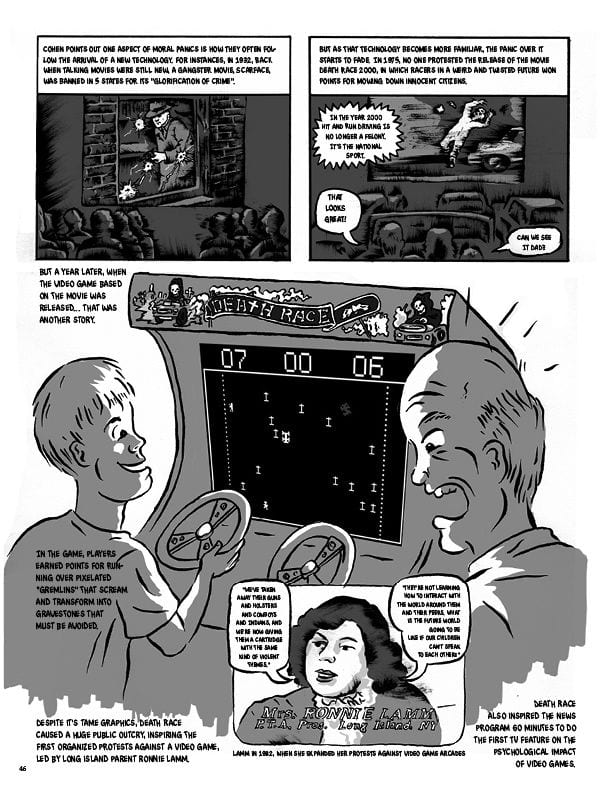For a book aimed at kids, this one is chock-full of information, but presented so well in comics (and also charts and info-graphics) that the details are destined to move easily, and usefully, into young minds. At least this (old) reviewer’s mind thinks so.
Back in the 1990s, Al Gore’s wife Tipper and Senator Joseph Lieberman from Connecticut apparently made a pact to promote government censorship of rap music and Hollywood films, subjecting them to moral standards suitable for the edification of American Youth. Under questioning, the Senator admitted that he hadn’t actually listened to the music or seen the films; nevertheless, he knew perfectly well what was good (and bad) for the kids. At least one keen observer, music promoter Danny Goldberg (his acts included Bonny Raitt and Tom Morello), swore that this move and all the associated rhetoric of condescension may well have cost the Democrats the 2000 presidential election. Compared to losing the potential youth vote, the threat of Ralph Nader was—well, if not nothing, then a lot less crucial than claimed at the time, and later, by embittered Democrats.
We can’t prove turned-off young people swung the election by not voting—thus impacting U.S. and world history in pretty bad ways. But articles in the press and on the blogosphere these days remind us frequently that Millennials are turned off to conservative cultural values and also turned off to political promises from every corner. We are warned, by most of the same sources, that electronic devices encourage users to ignore the outside world. These devices in every imaginable form obviously keep the economy going--just look at the business section of the New York Times. But they are also—or are feared to be—bad, bad, bad in the hands of irresponsible youth.
Turning the pages of Bad for You, we learn that society has been here before, centuries ago, and gone there again and again and again. Even Plato warned that children should unlearn what they had learned in nursery tales and such. The rhymes of Mother Goose (collected and published in English in the 18th century) and the fairy tales of the Brothers Grimm (the early 19th) were widely considered dangerous. Soon enough, crime and misbehavior of lesser sorts could be blamed on … reading! By the late 19th century, America’s own Anthony Comstock urged the burning of cheap novels, and even halted distribution of anatomy textbooks to medical students for their obscene nature!

This story gets closer to our own day with the anti-comic book crusade of the 1940s and '50s, and the successive attacks on all sorts of fiction for young people, recently and notably including the Harry Potter novels. Naturally, comics had been the best-selling publications of any kind in the U.S., and Harry Potter books were far and away kids’ own choice. What’s wrong here?
Collaborators Pyle and Cunningham lay it out clearly, with recurrent references to would-be comic censor Fredric Wertham, and offer sophisticated, humorous explanations that I wish I’d had on hand in my teen years. They broaden the subject by bringing the supposed threats of jazz and rock ‘n roll to youth morality as the precursors to all the similar threats of the last forty years. For instance, Goth outfits, skateboards, video games, flash mobs, zombie marches—to mention only a few!

Why are the grown-ups so afraid, and what is their alternative to kids’ impulses for uncontrolled play? The second question is easier to answer: more homework, more controlled and focused time in general, with at least one inevitable result, less sleep. The pressure to structure the day and night has, over the last century, reduced the size of playgrounds, shortened or eliminated recess, and enforced all manner of incidental rules. The pressure to keep young people in line by offering dire examples of punishment has sent men and women under 16 into long prison terms and solitary confinement.
It is harder to answer what society fears so badly. At a guess: Not that there is less chaos or violence than in centuries past (this may remain about constant when all problems should be solved, of course: “progress”) but perhaps because business and civic leaders themselves have so much less confidence in the system they manager or mismanage.
All this takes us too far, no doubt, from the fine writing and acute art. Let us just say that they hit the mark.##
Paul Buhle is a frequent contributor to TCJ. His latest comic is Bohemians (Verso Books).







